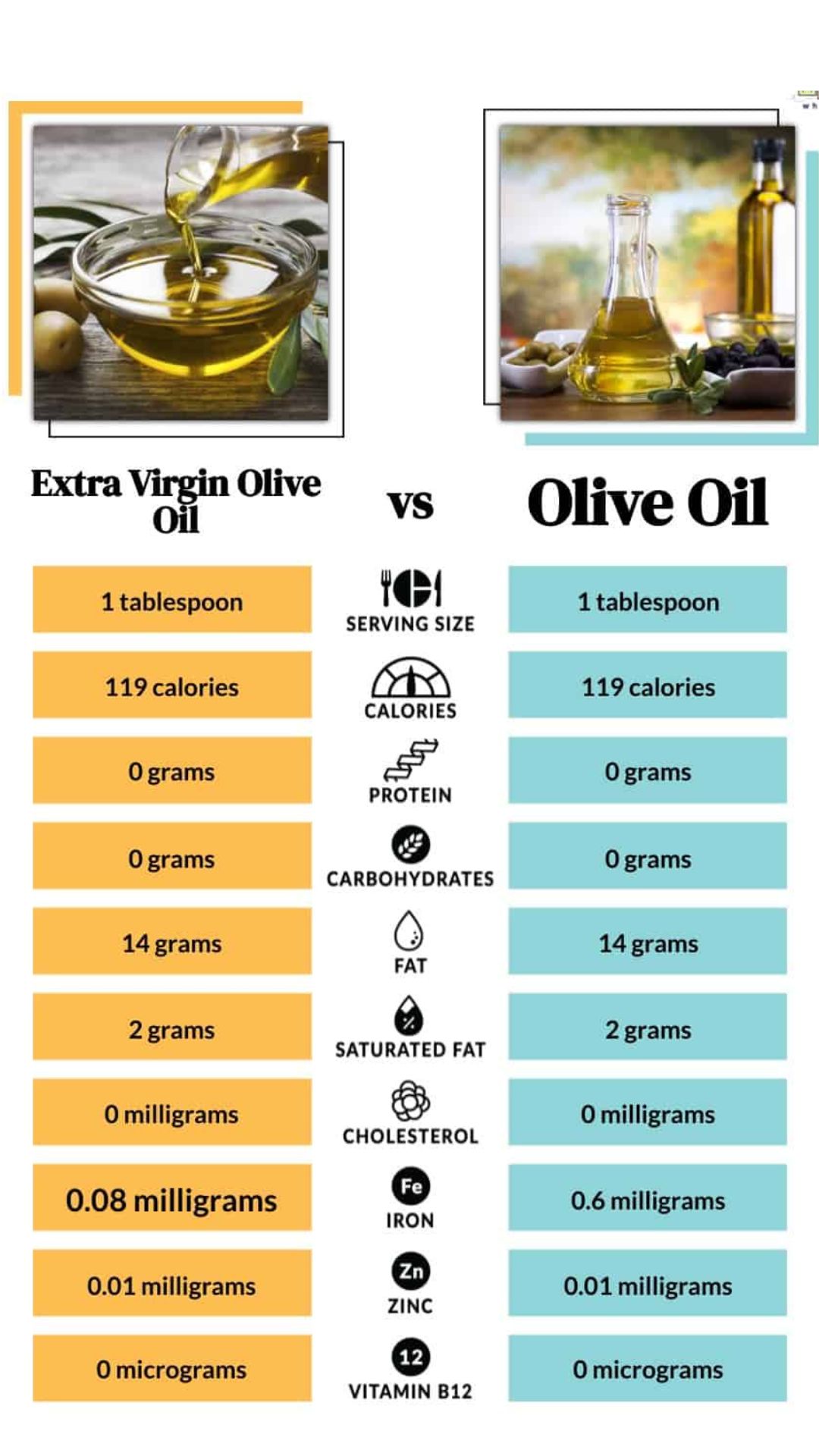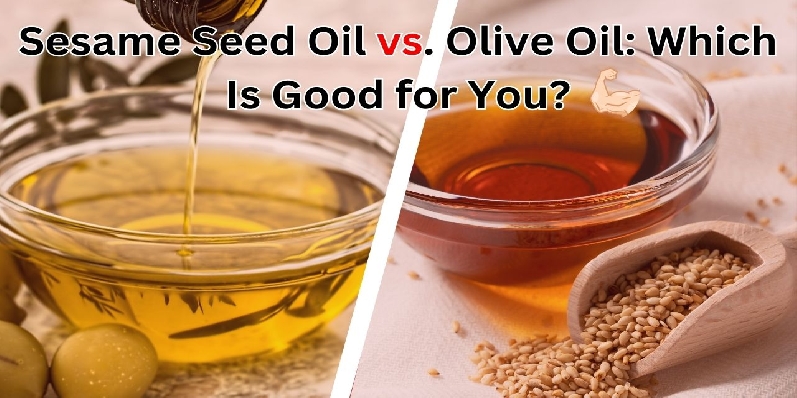
24-05-2024
Sesame Seed Oil vs. Olive Oil: Which Is Good for You?
- Admin
Introduction
Sesame seeds and olive oil are popular in the world of cooking oils. Choosing the right oil can have an important effect on your health and the taste of your dishes. This blog aims to compare sesame seed oil and olive oil. It will examine their health benefits, nutrients, food uses, and other factors. Its goal is to help you make a smart decision.
1. Overview of Sesame Seed Oil.
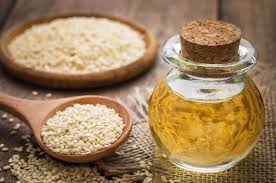
In Asian food, people use natural sesame seed oil, which comes from sesame seeds. It has a rich, nutty flavor that adds a unique touch to dishes. There are two main types of sesame seed oil: light (or plain) and toasted. Producers make light sesame seed oil from raw sesame seeds. It has a mild flavor. Toasting sesame seeds make toasted sesame seed oil. It has a stronger flavor.
Common Uses in Cooking and Health:
Sesame seed oil is commonly used for cooking, especially for stir-frying and making salad dressings. It is also added to dishes to give them a nice flavor. Besides cooking, people use it in medicine and skincare because it's good for your health.
Nutritional Profile:
-
Calories: Approximately 119 calories per tablespoon.
-
Fats: 14 grams of fat per tablespoon, polyunsaturated and monounsaturated fats.
-
Vitamins and Minerals: It contains vitamins E and K, as well as different vitamins.
2. Overview of Olive Oil
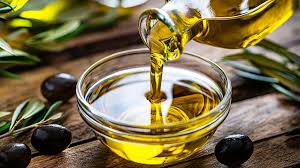
People extract olive oil from olives, which is the basis of Italian cooking. It comes across a range of levels. Extra-virgin olive oil is the best grade. It comes from the first movement of olives and has no chemical processing.
Common Uses in Cooking and Health:
Olive oil is good for cooking. It is an open method for cooking, roasting, and grilling. It provides the basis for dressings and sauces. It is particularly famous for its health benefits. It's a key part of the Asian diet.
Nutritional Profile:
-
Calories: Approximately 120 calories per tablespoon.
-
Fats: 14 grams of fat per tablespoon, monounsaturated fats.
-
Vitamins and Minerals: Rich in vitamin E and antioxidants, such as polyphenols.
3. Health Benefits of Sesame Seed Oil
Heart Health:
Sesame seed oil has lots of omega-6 fatty acids and antioxidants. These include sesamol and sesamin. They can't cut reactive stress and strengthen heart health.
Benefits for Skin and Hair:
Rich in vitamin E and other antioxidants is sesame seed oil. It is often used in skincare for its moisturizing and healing properties. It's able to help improve skin stretch, reduce the appearance of scars, and nourish hair.
Potential Risks or Side Effects:
Some people may be allergic to sesame seeds. Eating the oil could cause allergic reactions.
Yash Industry Group: Quality Sesame Seed Oil Producers
Yash Industries founder back in 2001. It's one of the leading manufacturers and exporters of spices and sesame seeds. Yash Industries has received certification from renowned organizations. These include ISO 22000:2018 HACCP. It guarantees excellent quality and client satisfaction. They lead the industry. They do this because they dedicate themselves to innovation and sustainability. The Yash Industries Group employs cutting-edge technology. They generate sesame seed oils that are both light and roasted. These oils are beneficial to health and meet a variety of culinary purposes. They dedicate themselves to achieving excellence. This guarantees that customers will receive tasty, pure oils. The oils improve flavor and well-being.
4. Health Benefits of Olive Oil
Heart Health:
Olive oil is rich in monounsaturated fats, like oily acid. It lowers bad cholesterol levels (LDL) and raises good cholesterol levels (HDL). This supports heart health.
Anti-Inflammatory Properties:
Olive oil contains antioxidants, like oleocanthal, that have strong anti-inflammatory properties. This can be useful in the treatment of long-term infections.
Benefits for Skin and Hair:
People use olive oil in skincare because of its moisturizing properties. It's believed to help with anti-aging by protecting the skin from damage by oxygen. It also provides nutritious hair and improves scalp health.
Potential Risks or Side Effects:
While rare, some people may have allergies to olive oil. Eating too much soda may be out of balance with your diet.
5. Comparison of Nutritional Profiles
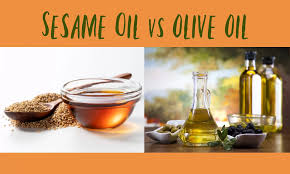
Fat Types:
-
Sesame Seed Oil: polyunsaturated fats, including omega-6 fatty acids, and some monounsaturated fats.
-
Olive oil: monounsaturated fats (oleic acid).
Vitamin and Mineral Content:
-
Sesame Seed Oil: It contains vitamins E and K and antioxidants like sesamol and sesamin.
-
Olive Oil is rich in vitamin E and polyphenols, which are potent antioxidants.
Antioxidant Levels:
Both oils are rich in antioxidants, though the types and benefits can vary. Sesame seed oil has sesamol and sesamin. Olive oil has polyphenols, such as oleocanthal.
6. Cooking Uses and Smoke Points
Sesame Seed Oil:
-
Optimal uses: best for stir-frying, dressings, and as a flavor enhancer in Asian dishes.
-
Smoke Point: Approximately 410°F (210°C) about light sesame; go lower for toasted sesame oil.
Olive Oil:
-
Optimal uses: ideal for sautéing, roasting, grilling, and as the foundation for dressings and marinades.
-
Smoke Point: Approximately 375°F (190°C) for another virgin olive oil, higher for refined olive oil.
7. Taste and Flavor Profiles
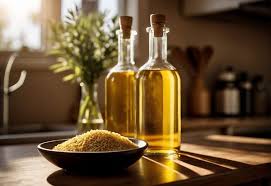
Sesame Seed Oil:
-
Flavor: It's nutty and robust, with a powerful, unique flavor. This is especially true for the toasted variety.
-
Impact on Dishes: It adds depth and a unique flavor to Asian cuisine and other dishes.
Olive Oil:
Flavor: It's fruity and peppery. The flavors vary based on the variety and processing.
Impact on Dishes: Mediterranean dishes enjoy a better flavor. Chefs can use it as a finishing oil.
8. Cost and Availability
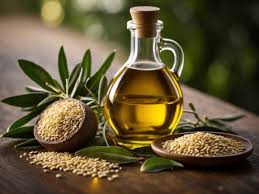
Sesame Seed Oil:
-
The average price varies by type, it costs more than common cooking oils, but not always.
-
Availability: available in Asian markets, health food stores, and online.
Olive Oil:
-
Typical Cost: It varies, with extra virgin olive oil being the most expensive.
-
Availability: available in grocery stores, particular markets, and online.
9. Sustainability and Ethical Considerations
Sesame Seed Oil:
-
Production practices must cut water and manual labor. These can raise sustainability concerns.
-
Environmental impact depends on farming practices; organic and fair-trade options are more sustainable.
Olive Oil:
-
Production Practices: Olive farming can be water-intensive, but sustainable farming practices are available.
-
Environmental Impact: Olive oil production has a lower environmental footprint when done properly.
10. Conclusion
Both sesame seed oil and olive oil provide special health benefits and culinary uses. Sesame seed oil is rich in omega-6 fatty acids and antioxidants. This is good for heart health and reduces inflammation. Olive oil is high in monounsaturated fats and antioxidants. This supports heart health and reduces inflammation.
Choosing the Right Oil:
-
For heart health, olive oil may have a benefit because of its high content of monounsaturated fats.
-
For skin and hair, both oils offer benefits. But sesame seed oil has more vitamin E. This may be more helpful.
-
For cooking, choose sesame seed oil for Asian dishes. Use olive oil for Mediterranean cuisine.
In the end, the best oil depends on your health goals, tastes, and cooking needs. Incorporate both oils into your diet to enjoy their diverse benefits.
FAQs
Q. Can you substitute sesame seed oil for olive oil?
Ans. Yes, but the flavor profile will be different. Sesame seed oil has a stronger, nuttier taste.
Q. Which oil is better for high-heat cooking?
Ans. The smoke point of sesame seed oil is higher than olive oil. So, it's better for high-heat cooking.
Q. Are There any diet restrictions? restrictions for sesame seed oil, or is it olive oil?
Ans. People who have allergies to sesame or olives should avoid these oils. Always consult with a healthcare provider if you have specific dietary concerns.
